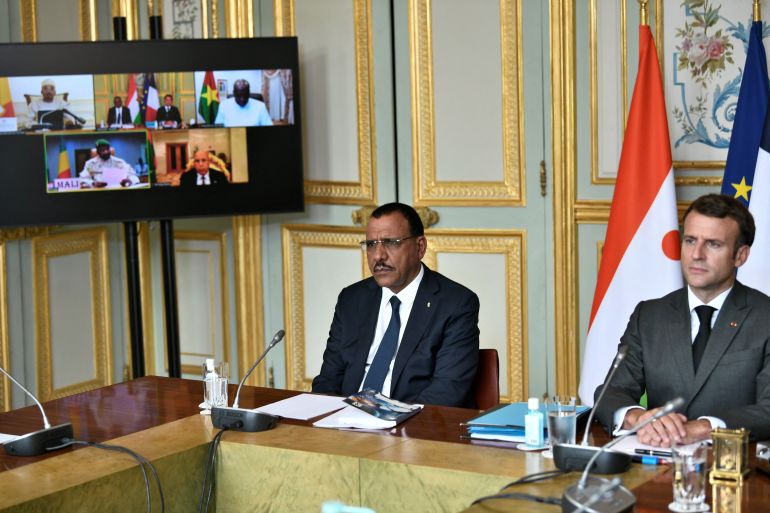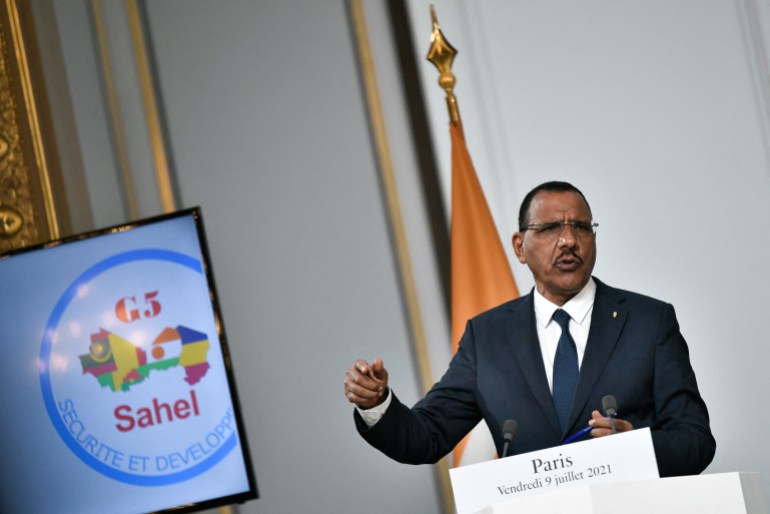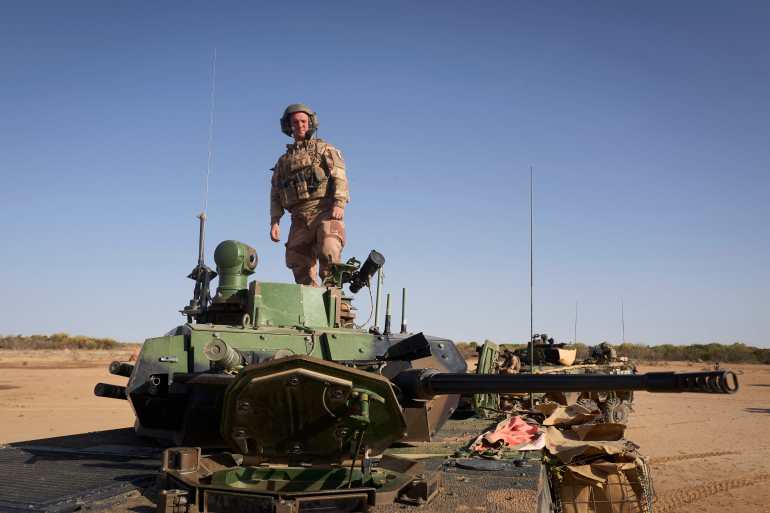France to pull more than 2,000 troops from Africa’s Sahel region
President Emmanuel Macron tells G5 summit that France will reduce its force to 2,500 to 3,000 troops over the long term.

France will soon begin reshaping its military presence in the Sahel region of West Africa and will ultimately halve it, President Emmanuel Macron has said.
Macron announced last month that he would start removing much of the 5,100-member Barkhane force in the Sahel after eight years of helping local forces stave off the threat from armed groups linked to al-Qaeda and ISIL (ISIS).
Keep reading
list of 4 itemsSolhan massacre exposes failure to tackle Sahel crisis
A letter from African intellectuals on the Sahel crisis
Record 29 million in the Sahel in need of humanitarian assistance
“We will remain committed. But to remain committed is also to adapt,” Macron told a news conference on Friday after a virtual summit with leaders of Niger, Mali, Chad, Burkina Faso and Mauritania that make up the G5 Sahel region.
Macron announced that France would reduce its force to 2,500 to 3,000 troops over the long term.
The French leader insisted that his country is not abandoning African partners, and would keep helping them fight groups linked to al-Qaeda and ISIL.
“France doesn’t have the vocation or the will to stay eternally in the Sahel,” Macron said. “We are there because we were asked to be.”
French troops have been present in Mali since 2013, when they intervened to force armed rebels from power in towns across the country’s north.
Operation Serval was later replaced by Barkhane and was expanded to include other countries in an effort to help stabilise the broader Sahel region.

Armed groups though have continued to launch devastating attacks against the militaries fighting them as well as increasingly against civilians.
Almost 7,000 people died due to the worsening fighting last year, according to data by the Armed Conflict and Location Event Data Project.
In late January, the United Nations warned the “unrelenting violence” had internally displaced more than two million people, up from 490,000 at the start of 2019.
Reconfiguring French presence
France will focus over the next six months on dismantling the Barkhane operation and reorganising the troops, Macron said.
The French military will shut down Barkhane bases in Timbuktu, Tessalit and Kidal in northern Mali over the next six months, and start to reconfigure its presence in the coming weeks to focus particularly on the restive border area where Mali, Burkina Faso and Niger meet.
Niger’s President Mohamed Bazoum, speaking at Macron’s side, welcomed the French military support and training, but on African terms.
“The main thing is that France maintains the principle of its support, its cooperation and support for the armed forces of our different countries. We need France to give us what we don’t have. We don’t need France to give us what we already have,” he said, without elaborating.
He acknowledged failings of local armed forces but also praised their courage in fighting armed groups.

France’s military presence in the future will focus on neutralising armed group operations and strengthening and training local armies, Macron said.
“There will also be a dimension of reassurance … to remain permanently ready to intervene rapidly in support of partner forces,” notably via military aviation from Niger and Chad.
This new structure “seems to us to respond better to the evolution of the threat”, he said. Once the reorganisation is complete, he said, “the Barkhane operation will close down.”
Political instability in Sahel
Some experts say that France’s decision may be linked to growing political instability in Mali.
Macron’s June announcement came days after Mali coup leader Colonel Assimi Goita was sworn as president of a transitional government, solidifying his grip on power in the West African nation after carrying out his second coup in nine months.
Late in June, the UN Security Council unanimously adopted a resolution extending the UN peacekeeping mission in crisis-wracked Mali and said it was “imperative” that the military government holds presidential and legislative elections on schedule next February.
The council maintained the ceilings in the UN force at 13,289 military troops and 1,920 international police, but it asked Secretary-General Antonio Guterres to make a recommendation on the force level given growing levels of insecurity and physical violence against the civilian populations in central Mali.
Al Jazeera’s Nicolas Haque reporting from Dakar, Senegal said Macron’s 2022 re-election bid was likely another reason for the announcement and noted that France has a long history of keeping forces in Africa and that it would continue to have a strong presence.
“French forces have been on the ground in Africa for more than 100 years. It continues to have, despite the announcement made, bases in former French colonies where it still has a strong military and security presence,” he said.